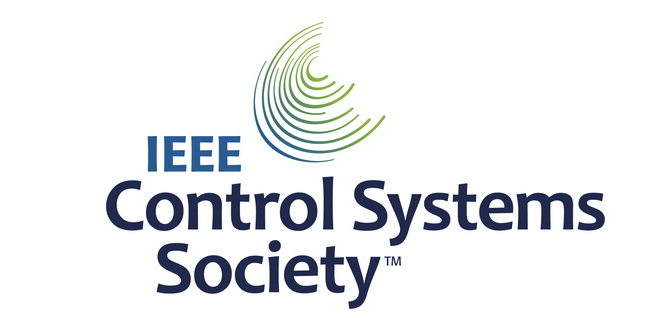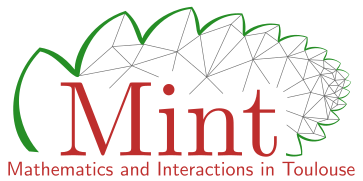|
CONFERENCE
|
5 videos available for this event!
|
Modélisation structurée, intégration géométrique et commande de systèmes multiphysiques contraints
18 – 22 April 2022
|
Scientific Committee
Comité scientifique Sören Hohmann (Karlsruhe Institute of Technology) |
Organizing Committee
Comité d’organisation Paul Kotyczka (Technical University of Munich) |
|
The port-Hamiltonian (pH) framework constitutes an innovative energy-based model paradigm that offers a systematic approach for the interactions of (physical) systems with each other and the environment via interconnection structures. It establishes a shift from discipline-oriented research to problem-oriented interdisciplinary research. It is a fundamental block for future high-tech initiatives in system engineering, such as digital twins. The inherent structure of port-Hamiltonian systems encodes control theoretical concepts such as passivity and stability, facilitates structure-preserving approximation schemes, enables short-term recursions in linear systems solves, and enlarges the distance to in stability. The framework benefits from controller design based on the assignment of the energy and power-flow structure in closed-loop, for finite- and infinite-dimensional systems. The goal of this conference is to bring together international experts from disciplines such as but not limited to systems and control theory, numerical analysis, numerical linear algebra, and geometric integration, whose interaction is likely to foster new ideas and shape further research directions.
|
L’approche hamiltonienne à ports s’appuie sur la représentation, à l’aide de structures d’interconnexion géométriques, des échanges de puissance dans les systèmes multi-physiques ouverts. Il s’agit d’un paradigme intégrateur et unificateur particulièrement bien adapté pour aborder des problèmes de recherche multidisciplinaires ou interdisciplinaires. En particulier, cette approche peut contribuer, de manière déterminante, aux grandes évolutions en cours de la théorie des systèmes, comme par exemple le développement des jumeaux numériques. La stabilité par interconnexion, combinée à la capacité d’intégrer des systèmes multi-physiques très divers par nature, confèrent en effet à l’approche la modularité et l’efficacité nécessaires. Les propriétés intrinsèques des systèmes hamiltoniens à ports incluent, de manière structurelle, la passivité et la stabilité par interconnexion, décisives pour aborder les problèmes de commande non linéaires. Les structures d’interconnexion, inhérentes au systèmes hamiltoniens à ports, sont également à la base du développement de méthodes d’intégration géométrique en temps et en espace. Tous ces résultats s’appliquent aussi bien aux systèmes de dimension finie, qu’aux systèmes à paramètres répartis.
|
Robert Altmann (University of Augsburg) PDAE modeling of parabolic systems with dynamic boundary conditions
Peter Betsch (Karlsruhe Institute of Technology) GENERIC-Based Structure-Preserving Discretization of Mechanical Systems Undergoing Finite Deformations
Elena Celledoni (NTNU) Deep learning of diffeomorphisms for optimal reparametrizations of shapes
Carmen Chan-Zheng (University of Groningen) Tuning rules for Passivity-based controllers for mechanical systems
Silke Glas (University of Twente) Symplectic Model Reduction of Hamiltonian Systems on Nonlinear Manifolds
Ralf Hiptmair (ETH Zurich) The Topolgy of Circuit-Field Coupling
Tobias Holicki (University of Stuttgart) A Dynamic S-Procedure for Dynamic Uncertainties
Birgit Jacob (University of Wuppertal) Dissipative partial differential-algebraic equations
Paul Kotyczka (Technische Universität München) Discrete-time port-Hamiltonian systems and control
Yann Le Gorrec (ENSMM UBFC) Energy/entropy assignement for boundary controlled irreversible PHS
Björn Liljegren-Sailer (Trier University) Snapshot-based model reduction under compatibility conditions for pH systems
Alessandro Macchelli (University of Bologna) Control design for sample-data PHS
Bernhard Maschke (Université Lyon 1) Port variables for Thermodynamic Systems
Denis Matignon (Université de Toulouse) Structure-preserving discretization of infinite-dimensional pH sustems : a mixed FEM
Volker Mehrmann (TU Berlin) Short term behaviour of Dissipative Hamiltonian Systems, continuous and discrete time
Kirsten Morris (University of Waterloo) Decay Rate of pH Systems with Boundary Dissipation
Christian Offen (Paderborn University) Variational integration of learned dynamical systemsession
Brynjulf Owren (NTNU, Norway) Energy conservation and dissipation for numerical integrators on Riemannian manifolds
Hector Ramirez (Universidad Tecnica Federico Santa Maria) Irreversible port Hamiltonian systems
Carsten Scherer (University of Stuttgart) Dissipativity-based synthesis of optimization algorithms and extremum controllers
Jacquelien Scherpen (University of Groningen) Structure preserving model reduction and extended balancing of pH systems
Timo Ströhle (Karlsruhe Institute of Technology) Galerkin space-time discretization approach to the inverse dynamics of flexible multibody
Stefano Stramigioli (University of Twente) pH Mimetic discretisation
Benjamin Unger (University of Stuttgart) Surrogate models for port-Hamiltonian systems
Arjan Van der Schaft (University of Groningen) pH DAEs: structure and properties
Anna Trang Vu ((EPFL), Swiss Plasma Center (SPC)) A combined Control by Interconnection – Model Predictive Control design for constrained PHS
Michal Wojtylak (Jagiellonian University in Krakow) Stability of matrix polynomials with various postive-definiteness conditions on coefficients
Hans Zwart (University of Twente) Structure model order reduction for pH systems









